Geography Careers - Alumni Profiles
Geography can be the first step towards a wide variety of careers and in recent years graduates have proceeded to employment in management consultancy, local and central government, law, conservation and heritage management, the law, the media, teaching and research.
Find out more about some of our alumni:
- Sam Woor, DPhil student, School of Geography and the Environment, Oxford
- Catherine Buckland, Postdoctoral Research Assistant, School of Geography and the Environment, Oxford
- Nicola Golding, International Climate Services Manager, Met Office
- Jerome Mayaud, Lead Data Scientist, Spare Labs
- Joshua Lanham, Postgraduate student at Imperial College, London
- Sam Drury, Consultant, British Airways
- David Jackman, Member of Sustainable Communities Committee, BSI
- Nicola Beynon, Head of Campaigns, Humane Society International
- Kwasi Boahene, Director (West Africa), PharmAccess
- Raphaëlle Vallet, Sustainable Finance Manager, The Green Investment Group
- Hilary Allison, Head of Ecosystem Assessment Programme, UNEP-WCMC
- Karoline Popp, Researcher, Expert Council of German Foundations on Integration and Migration
- James Pattinson, Co-founder and Ordnance Officer, Reluctantly Brave
- Francesca Marenghi, Senior Global Partnerships Manager, UNICEF
Sam Woor, DPhil student, School of Geography and the Environment, Oxford
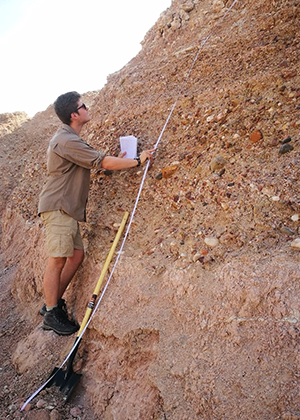
"I chose the Earth System Dynamics and Environmental Geography core papers for finals, as well as optional modules in Desert Systems Dynamics, Climate Change Impact and Adaptation and The Quaternary Period.
"The most memorable moment of my degree was the 2nd year fieldtrip to Tenerife during which I did a project about rock weathering on Mount Teide. This experience really sparked an interest in me for doing research first hand and gave me a taste of undertaking fieldwork abroad and working as a team to answer questions about the natural world. It also allowed me to work closely with researchers from the School of Geography and learn more about their career paths, what their jobs as academics and lecturers entail and get some really useful advice about my future career options.
"In fact, this trip prompted me to start exploring the possibility of doing a DPhil following graduation from my undergraduate degree so I could pursue my interests in Physical Geography and, specifically, long-term environmental change. I was successful in obtaining funding through the Engineering and Physical Sciences Research Council for a project focusing on using luminescence dating to understand environmental and climate change in the Hajar Mountains, Oman, over the last 300,000 years."
Why physical geography? "Physical Geography was my thing because I am someone who is fascinated by the natural world in practically all of its aspects. The scope of Physical Geography not only is incredibly broad, offering the chance to study subjects as diverse as extreme weather, rainforest conservation and sand dune migration, but also encourages this holistic approach to understanding our planet. As such, it is the only subject perfectly positioned to answer the most pressing questions about our past, present and future relationship with our environment - who wouldn't find this interesting?"
Catherine Buckland, Postdoctoral Research Assistant, School of Geography and the Environment, Oxford
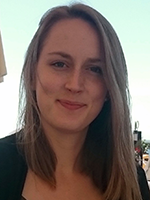 "I completed the Oxford Geography course from 2008-2011 and particularly enjoyed the opportunity to engage with world experts on their specialist areas of research. Highlights were definitely fieldwork in the UAE and Georgia, and also studying the optional modules which give you a chance to go into the detail of the topics.
"I completed the Oxford Geography course from 2008-2011 and particularly enjoyed the opportunity to engage with world experts on their specialist areas of research. Highlights were definitely fieldwork in the UAE and Georgia, and also studying the optional modules which give you a chance to go into the detail of the topics.
"The options I chose spanned both Human and Physical courses: African Societies and Dryland Environments. At the time I had no idea that >10 years later I would end up working as a researcher looking at bioeconomic opportunities in African drylands!
"My undergrad dissertation used a combination of lab and field techniques to look at changes in a peatland bog (Georgia) over the recent past. Taking on a field / lab-based dissertation was great and gave me a chance to immerse myself in conducting research at a university level. Not only did I meet a whole new group of researchers in the labs, I also relished becoming a "mini-expert" on my research question and learning new techniques which I ended up using in the coursework on my other modules.
"Key competences that I take away from the physical geography course include: a number of indispensable technical skills (stats, labs, mapping), and the ability to frame and know how to tackle research problems. These skills have been useful not only in my current research role and post-graduate research degrees, but also for helping me to previously work in a problem-solving numerate environment in corporate banking."
Why physical geography? "For me, environmental research combines problem solving with the natural environment. Physical geography gives you the opportunity to really learn about how scientists conduct research and tackle some of the most pertinent challenges of the 21st century."
Nicola Golding, International Climate Services Manager, Met Office
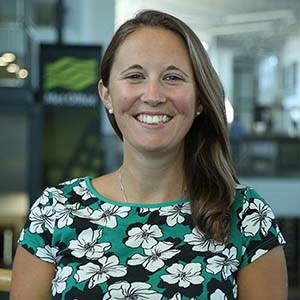 "I loved studying geography at Oxford. The variety of courses and the different ways of learning, alongside unique opportunities to learn from world experts at the forefront of their research, made it such a rich, rewarding and stimulating experience. Not to mention a wonderful community of interesting people from undergrads, postgrads, support staff and tutors.
"I loved studying geography at Oxford. The variety of courses and the different ways of learning, alongside unique opportunities to learn from world experts at the forefront of their research, made it such a rich, rewarding and stimulating experience. Not to mention a wonderful community of interesting people from undergrads, postgrads, support staff and tutors.
"I would have enjoyed most of the specialist topics on offer, but chose to focus on physical geography options (Dryland Geomorphology and Climatic Change and Variability), which led to my dissertation topic studying the projected changes in global forest fire hazards under climate change throughout the 20th Century. This gave me the opportunity to work more closely with the world-leading expertise in the Geography department and to really get deeper into the science. It also gave me contacts outside of the University, which subsequently led to my appointment as Adaptation Scientist at the Met Office following graduation.
"Since then I have continued to draw on everything I learned during my time at Oxford. We were taught to explore the interplay and connections between different human and physical systems and nowhere is this more important than the greatest challenge of our time - climate change. The physical science training I received has provided an excellent basis to becoming a credible research scientist at one of the UK's best known institutions, and my knowledge and connections in associated areas of research have given me a valuable perspective and skills in my chosen field of Climate Services."
Why physical geography? "Geography explains the world around us, and in particular the interactions between people and the environment around us. There has never been a more fascinating topic to learn more about for me, and in particular I'm drawn to how the environment impacts how we live, and how we can impact and manage the environment for the better to enable communities to live and thrive in partnership with the environment."
Jerome Mayaud, Lead Data Scientist, Spare Labs
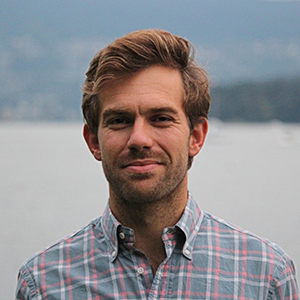 "A memorable first-year tutorial involved me trying - and tragically failing - to explain adiabatic lapse rates back to a professor (i.e. somebody who actually knew what a lapse rate was). After this episode, I was surprised not to feel downhearted; rather, I was awed and excited. Awed by how many things around me I'd taken for granted, like clouds. And excited by the prospect of three years sitting in turreted rooms and uncovering mystical unknowns with the help of world-class experts. It was my gateway drug to Physical Geography.
"A memorable first-year tutorial involved me trying - and tragically failing - to explain adiabatic lapse rates back to a professor (i.e. somebody who actually knew what a lapse rate was). After this episode, I was surprised not to feel downhearted; rather, I was awed and excited. Awed by how many things around me I'd taken for granted, like clouds. And excited by the prospect of three years sitting in turreted rooms and uncovering mystical unknowns with the help of world-class experts. It was my gateway drug to Physical Geography.
"The first year of my degree revealed a passion for climatology, geomorphology and remote environments. I figured that should mean studying a Special Subject combining all three, so I gravitated towards Dryland Environments. Little did I know that this would instil a thirst for further study, with a Masters degree in glaciology (ice sheets are deserts too) and a PhD in… well, sand dunes!
"That's not to say I mutated into a die-hard Physical Geographer and never looked back. I was lucky to have an inspirational Tutor who took us on wild journeys through the 'human' world, from Marxist interpretations of climate change to gendered gazes on the labour market. Retaining these human touches helped to inform my work long after my undergraduate degree: I weaved many sociological methods into my physics-heavy PhD, and worked as a postdoc using computational modelling to research social equity issues.
"Today, I lead a Data Science team in a tech startup that builds software for on-demand public transportation (think Uber meets city buses). Without a doubt, my Physical Geography background is a huge part of why I'm here: I learnt how to collect and analyse large datasets using appropriate statistical methods, and I picked up a variety of coding languages along the way. Above all, my degree helped me build solid foundations in the 'scientific method', learning how to blend deductive (hypothesis-based) and inductive (pattern-based) reasoning. That's a real asset in the world of big data. Human Geography continues to influence me too. For instance, I always pay close attention to intersectionality when assessing how my models and analyses might impact the lived experiences of transport users.
"That's not to say my journey through Geography has always been smooth. The discipline's diversity is a constant source of internal tension, with sociologists, quantitative scientists, gender experts and physicists fighting over crowded ground. I often struggled to identify which 'tribe' I belonged to. If I didn't click with Quaternary Science, did that mean I couldn't label myself as a Physical Geographer? If I enjoyed studying how the definition of climate change varies by culture, did that make me a dreaded social constructionist?
"However, as I have floated down its metaphorical river, meandering into adjoining fields from Computer Science to Politics, I have realised that Geography's schizophrenia is not a disorder. It's a strength. And it's made me the scientist I am today."
Joshua Lanham, Postgraduate student at Imperial College, London
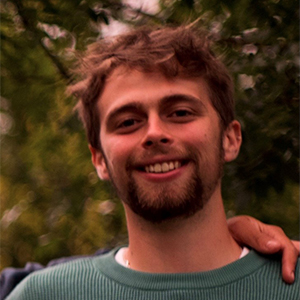 "When I first started the degree, I thought of myself as more of a human geographer. But the first-year physical course was so good that I ended up following a much more physical pathway. I loved the climate science module in first year and went on to take modules in climate change and variability, climate change impacts and adaptation, and complexity. These modules were supplemented with a second year fieldtrip to Tenerife, which was a great opportunity to get some experience of research in a real-world setting. In my dissertation I used climate models to investigate climate change over southern Africa, and this inspired me to go on to do a masters in climate science in Reading. Next year I am due to start a PhD at Imperial College in London researching arctic climate dynamics. The interdisciplinary nature of the physical geography pathway at Oxford suited me really well - it situates scientific issues within the context of their meaning for a range of global societies."
"When I first started the degree, I thought of myself as more of a human geographer. But the first-year physical course was so good that I ended up following a much more physical pathway. I loved the climate science module in first year and went on to take modules in climate change and variability, climate change impacts and adaptation, and complexity. These modules were supplemented with a second year fieldtrip to Tenerife, which was a great opportunity to get some experience of research in a real-world setting. In my dissertation I used climate models to investigate climate change over southern Africa, and this inspired me to go on to do a masters in climate science in Reading. Next year I am due to start a PhD at Imperial College in London researching arctic climate dynamics. The interdisciplinary nature of the physical geography pathway at Oxford suited me really well - it situates scientific issues within the context of their meaning for a range of global societies."
Why physical geography? "For me, physical geography provided a way to directly work on climate change issues with a number of inspiring people working at the forefront of some the biggest issues today."
Sam Drury, Consultant, British Airways
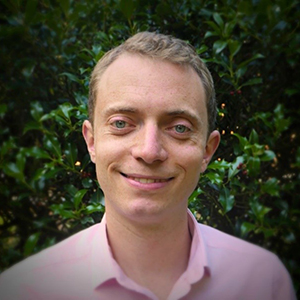 Sam Drury first came to Oxford in 2006 to pursue a bachelor's degree in Geography. Now working in the travel industry, Sam discusses his career and how reading geography planted the seed that led him to where he is today.
Sam Drury first came to Oxford in 2006 to pursue a bachelor's degree in Geography. Now working in the travel industry, Sam discusses his career and how reading geography planted the seed that led him to where he is today.
Sam currently works as a Principal Analytics Consultant for British Airways. Though he specialised in economic geography in the aviation industry for his undergraduate thesis, Sam admits that he hadn't thought about his studies as leading to any one specific career path: "I just learnt about the things I thought were important and was passionate about".
In his day-to-day work, Sam answers the big questions faced within the travel sector: what planes to buy, where they should fly and when, how much fuel to carry to safely minimise carbon emissions, and forecasting potential problems to avoid delays. He explains, "in short, I use analytics and data science to help British Airways make smarter decisions".
In an increasingly data-dominated world, "we can learn an awful lot about how things work, and (more importantly) how things should work". This is where analytics consultancy comes in. Data is often messy and confusing, and making sense of huge datasets can be hard. Businesses need people who can make sense of their data, coming up with solutions to difficult challenges:
"Was a flight delayed because there was fog, because a crew member was sick, or because an earlier flight that day was blocking the gate? Or perhaps a combination of these things? How can we find insight for the data to identify the problem and then take action to stop it from happening again in the future?"
Though Sam admits that analytics consultancy may not sound the most creative career path, he considers creativity and innovation the most rewarding aspects of his profession: "I love coming up with ideas that haven't been done before, and pushing the boundaries of what we can use technology to achieve". Sam believes that a geographical line of thinking spurs this creativity, teaching him to think holistically and to not be afraid to re-think or change his mind:
"It showed me that the world changes constantly, and in order to keep up you need to re-evaluate your views regularly and always keep an open mind."
Sam has undeniably had a successful and enjoyable professional career, utilising the skills and knowledge he acquired at undergraduate level and applying this into the working world. Though he admits that one's career is an integral component of life, Sam reminds us that we can all benefit from simply engaging with what we enjoy:
"Enjoy your time off, keep in touch with your friends and family, travel the world, and never stop learning. As long as you work hard and follow your passion, you'll end up doing something you love".
David Jackman, Member of Sustainable Communities Committee, BSI
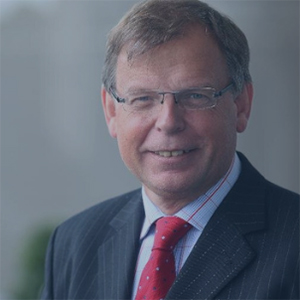 David has ventured into a vast array of careers since graduating, from banking to teaching to acting as the trailblazer for corporate ethics - all whilst working towards promoting a more sustainable world. David discusses with us his work in sustainable development and how, alongside his impressive career portfolio, he remains proud to be called a geographer.
David has ventured into a vast array of careers since graduating, from banking to teaching to acting as the trailblazer for corporate ethics - all whilst working towards promoting a more sustainable world. David discusses with us his work in sustainable development and how, alongside his impressive career portfolio, he remains proud to be called a geographer.
Having briefly embarked into the field of banking following graduation, David soon found that the archetypal 'job in the City' was not for him. After spending several years in the education sector, followed by some time at the Financial Services Authority (FSA), David landed a parallel role with the British Standards Institution (BSI). Here, he soon came to realise that "sustainable development initiatives promoted by government were becoming mired in prescription and bureaucracy".
This inspired David to take action. Armed with a focus on principles and outcomes developed at FSA, David introduced and set a National Standard for sustainable development - which saw the introduction of sustainability frameworks across many other industries and scales, including the 2012 Olympics, film production and supply chain management. He contends that his learning at Oxford allowed him to apply these frameworks effectively, in a way that maximised impact:
"It directly changed how I saw and understood things, how I related with and valued people, and how I applied ethics to business situations."
More recently, David has been leading the UK input to an ambitious, holistic framework for 'Smart, sustainable and resilient cities' (ISO 37101). These are used to structure the planning and building of new cities and have already been adopted by 21 cities in China. Other global cities such as Toronto, Riyadh and Mexico City are using the framework to transform their approach to sustainability. His impressive work was recognised when he was named as 'International Standards Setter of the Year' by BSI.
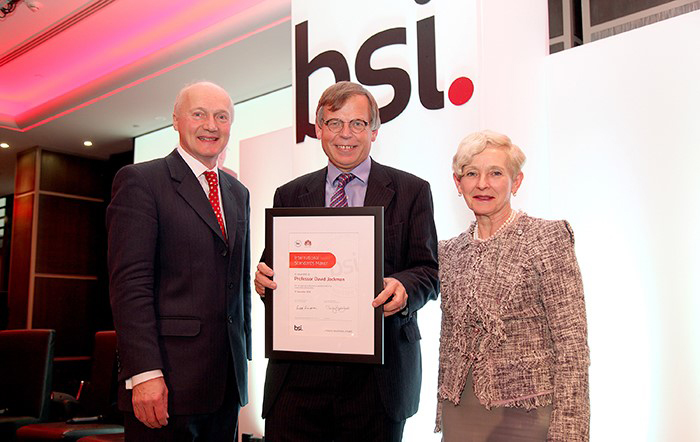
Now residing in the heart of the Lake District, David has since asked BSI for some "free reign" to see if he can come up with a similar framework for rural areas. Echoing much of what he learnt as a human geographer back in the 70s, he seeks to explore what happens to farming post-EU and "build greater social cohesion, a sense of belonging and the sense of place".
During a time when "there were nothing like the choices available in the environmental and NGO sectors that exist today", David made the most of the skills he had learned from geography and found ways of applying them in some unlikely areas. In his career, he has pioneered the field of corporate sustainability and, ultimately, is contributing towards a more sustainable and ethical world.
Nicola Beynon, Head of Campaigns, Humane Society International
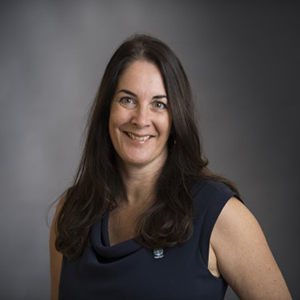 Based in Sydney Australia, BA alumna Nicola shares with us how she spends her days tackling the global challenge of biodiversity loss, and how her desire to work in environmental protection was affirmed through her geography studies.
Based in Sydney Australia, BA alumna Nicola shares with us how she spends her days tackling the global challenge of biodiversity loss, and how her desire to work in environmental protection was affirmed through her geography studies.
Nicola considers her professional career a vocation. She has worked with several organisations dedicated to conservation, including The Wilderness Society Australia, World Animal Protection, and The New South Wales Greens. At present, she is the Head of Campaigns for Humane Society International - a charity that seeks to "build an ecologically sustainable and humane world for all animals".
The threat of environmental degradation and biodiversity decline has become very real in Australia. The recent bushfires saw more than a hundred threatened species lose more than 30% of their habitat, with a further 1 billion species dying due to these uncontrolled fires. Nicola notes, "I have seen the devastation it has wrought first-hand at Kangaroo Island, which was a haven for wildlife". To combat these threats, we require "the community and us all as individuals to sum up much greater political and personal will than is currently on display".
Humane Society International serves a paramount role in leading the charge against further loss of biodiversity. The organisation works to strengthen law and policy for animal protection in Australia and, as Head of Campaigns, Nicola's role is to provide strategic direction and campaign oversight for a team of campaigners working on wildlife conservation and animal welfare campaigns. For Nicola, the reason behind why we must nurture the bond between humans and the biosphere is simple:
"We are fundamentally dependent on ecosystems and the web of animal and plant life for our own wellbeing and livelihoods. I also hold a philosophical perspective that we are obliged to respect and minimise our harm to the other animals we share this world with".
Perhaps unsurprisingly, as an undergraduate Nicola was most interested in Ecology. She was particularly fascinated by the complexities and interdependencies of the natural world - something that she was able to explore throughout the course of her degree. Developing this understanding in an academic context, whilst also learning how to think critically and independently, has proved incredibly relevant to her career to this day - enabling her to work on some rather impressive landmark cases:
"A career highlight was taking the Japanese whaling company to court and winning. Another was securing protection for the Great White Shark at the UN Convention for International Trade in Endangered Species (CITES) from a trade in its jaws and fins".
As the IPBES Global Assessment of 2019 made abundantly clear, our global response to Nature's decline is insufficient. This is particularly pertinent in our Covid-19 impacted world, as commercial trade in wildlife poses a grave risk for zoonotic diseases (diseases that can be transmitted from animals to people). Nicola's work with Humane Society International is very relevant in tackling these issues head-on and - alongside a group of dedicated campaigners - is facing one of the biggest challenges of the contemporary world.
Kwasi Boahene, Director (West Africa), PharmAccess
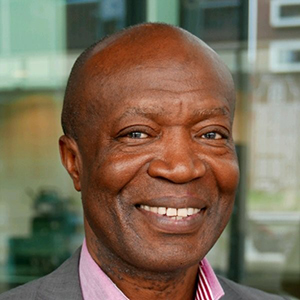 Born and bred in Ghana, as an Oxford undergraduate Kwasi Boahene took a particular interest in Economic Geography. He explains, "I believe that one of the most pressing challenges of our time is finding solutions to underdevelopment and inequalities within countries and across the world. Economic Geography provided the analytical tools for solving such problems by better and efficient utilization of limited resources across and within countries".
Born and bred in Ghana, as an Oxford undergraduate Kwasi Boahene took a particular interest in Economic Geography. He explains, "I believe that one of the most pressing challenges of our time is finding solutions to underdevelopment and inequalities within countries and across the world. Economic Geography provided the analytical tools for solving such problems by better and efficient utilization of limited resources across and within countries".
Equipped with these tools, along with a greater understanding of the inequalities embedded in society, after graduation Kwasi set out to attain his ultimate goal: "to strengthen the position of the poor and promote a sustainable world".
Kwasi has dedicated much of professional career to health and development across Africa, identifying the critical role that healthcare plays in fighting poverty and helping people live a dignified life:
"The majority of people, especially those at the bottom of the pyramid, are uninsured and have no financial protection when they need to pay for health care. They wait as long as possible before visiting a clinic, and when they do it, it often endangers their economic livelihood".
Kwasi currently works for PharmAccess, an international development organisation that uses digital technology to make healthcare affordable and accessible to people in Africa. Using mobile technology, the organisation can facilitate the mobilization of funds for care, real-time monitoring of patients and direct provision of care. Ultimately, such technology enables healthcare providers to "deliver more value for the same budget". PharmAccess has won several accolades for their work across the continent, including the Financial Times Transformation in Business Award, OECD Taking Development to Scale Aware and G20 SME Finance Challenge Award.
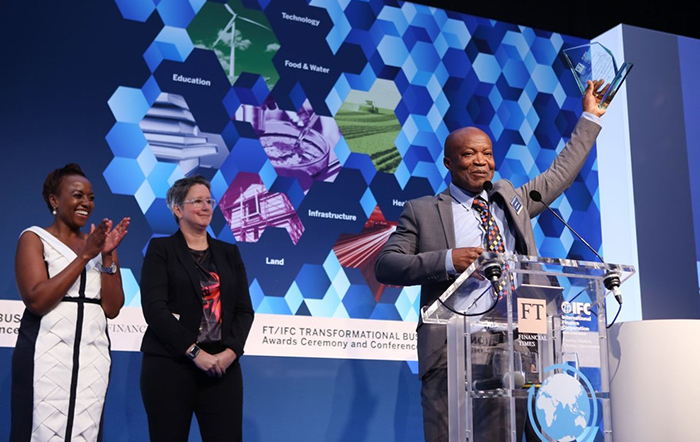
Serving as the Director of Advocacy and Partnerships for PharmAccess, Kwasi is responsible for building partnerships for policy change, research and scaling of business to ensure the sustainable financing and delivery of care across Africa. Critical to his career is the ability to look at challenges and solutions from a multi-faceted dimension, something that Kwasi believes his Geography studies taught him well. Though he admits working for a not-for profit organisation can be challenging at times, Kwasi considers there to be an intrinsic enjoyment to his career:
"There is a sense of accomplishment that my work has made a difference in someone's life. That a poor person in a village in Africa is able to access healthcare, without being pulled into poverty."
Kwasi has committed his life to making a difference in the lives of people who do not have the opportunities and capacities that he once took as a given. Concluding the interview with an old Ghanaian proverb, Kwasi reminds us that we all have the potential to better the world in which we live:
"If you think you are too small to make a difference, you have not spent a night with a mosquito!"
Raphaëlle Vallet, Sustainable Finance Manager, The Green Investment Group
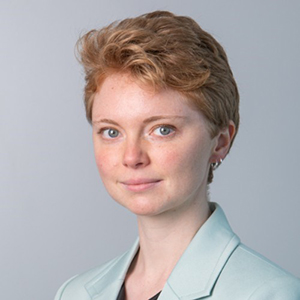 Growing up in France, Raphaëlle hadn't even considered applying to a British university until her last two years of high school, where she joined an international school and studied alongside students from different backgrounds. When arriving at Oxford, Raph explains how it "felt like finding the education system I needed but didn't know existed". Here, she reminisces on her time at Oxford and how it led her to where she is today.
Growing up in France, Raphaëlle hadn't even considered applying to a British university until her last two years of high school, where she joined an international school and studied alongside students from different backgrounds. When arriving at Oxford, Raph explains how it "felt like finding the education system I needed but didn't know existed". Here, she reminisces on her time at Oxford and how it led her to where she is today.
With a passion for the environment and the exploration of human-environment interactions, deciding to study Geography was not a difficult choice for Raph: "I loved the idea of a generalist degree that touched on social sciences, international relations as well as hard sciences like climatology or ecosystem dynamics". This multi-disciplinary approach gave her space to explore what she enjoyed most, ultimately encouraging her to pursue a path focused on strategy and politics.
While she looks fondly upon her academic studies, Raph made sure to make the most of her time in Oxford: she joined debating societies, started rowing, and joined the Committee organising the annual Oxford Climate Forum. She also benefited from travel grants from her college, St Hilda's, to spend 3 months in China to conduct research for her dissertation, and landed several summer internships in the finance sector. These experiences helped her deepen her passion for climate change and environmental issues and, soon enough, Raph decided that a career in the 'green economy' was best-suited to her.
After working on climate policy in the UK Government for five years, she now works for The Green Investment Group as a Sustainable Finance Manager, where she advises governments from developing countries on green finance policy and how they might set up specialised institutions and vehicles such as green banks. Her objective is to help increase investments in green infrastructure, build local capability and enable countries to own their climate agenda. This advisory service is inspired by a move made by the UK back in 2012 to set up the UK Green Investment Bank. The organisation, established in 2012, was the first institution of its type in the world: a publicly-funded bank designed to mobilise private finance into the green energy sector. In 2017 the Bank was acquired by Macquarie Group and became the Green Investment Group.
For Raphaëlle, there is something incredibly rewarding about her profession:
"What I think makes the green finance sector really special is that it delivers tangible outcomes. Especially at the Green Investment Group where we work predominantly on infrastructure projects: you can point at a wind farm and say, 'I helped build that'".
In today's world, evermore attention is being devoted to building a low-carbon and more resilient economy, with many governments now delivering on their ambitious targets to tackle the climate crisis. Most governments, however, are challenged by the scale and pace of the transition needed to limit global warming to 1.5 or 2°C. Creating business and investment opportunities out of these challenges to accelerate the transition is what make Raphaëlle so excited about her job. She enjoys challenging conventional ways of thinking and learning about others' experiences of climate change and other phenomena when deciding what advice to give, something that she was able to practice during her time at Oxford:
"We may all face the impacts of climate change and pollution, but the way we experience them and think about them is very different across the globe. My Geography tutors never tried to help us reach the 'right' answer about anything - we learned to question the material, think for ourselves and to reach and informed conclusion that met our own standards of balanced and disciplined reasoning."
Though Raphaëlle may not use the "hard facts" learned whilst at Oxford in her day-to-day role, the skills and experience she developed as an undergraduate have proved invaluable in her current occupation. Raphaëlle has landed herself in a career which combines her passion for reducing our environmental impacts with the fast-paced dynamic of the finance sector and, ultimately, is doing her "little bit to get us on a better trajectory for the planet".
Hilary Allison, Head of Ecosystem Assessment Programme, UNEP-WCMC
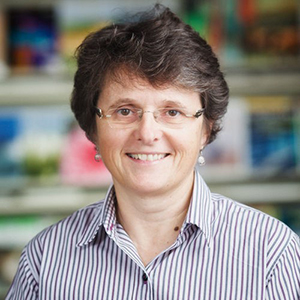 "There was always a sense of inevitability that I would end up pursuing this career" begins Hilary's story, "I knew that I needed a vocation rather than a job, one where I could try and make a difference".
"There was always a sense of inevitability that I would end up pursuing this career" begins Hilary's story, "I knew that I needed a vocation rather than a job, one where I could try and make a difference".
… and made a difference she has! The entirety of Hilary's career has been dedicated to environmental conservation in one way or another, in working for the National Trust, the Woodland Trust, the Forestry Commission and now the UN Environment Programme World Conservation Monitoring Centre (UNEP-WCMC). Her interest in biogeography as an undergraduate encouraged her to pursue an exciting, dynamic career in the conservation sector. Hilary shares with us what she has been up to since graduating from Oxford in 1980, demonstrating how a geographical understanding can help us face some of the most contemporary environmental challenges of our time.
The biosphere is the life support system on which we all depend, although, as Hilary contends, "in the developed world we often either take this for granted or forget about it completely". At present, natural resources are being consumed at unsustainable rate, a rate that Hilary believes will lead only to "economic suicide". For this reason, Hilary sees it essential to promote the protection and restoration of the environmental world - something that she has consistently lobbied for throughout her career.
One of Hilary's first posts was at Woodland Trust, where she worked as a Policy Director for the woodland conservation charity for several years. During this time, she found herself developing a real buzz for shaping and, indeed, changing national policy:
"It took 20 years to get the protection of ancient woodland enshrined in national planning policy, but we did it. Along the way, we lobbied hard to protect ancient woods from destruction and damage by development, put restoration of ancient woodland on the map and argued constantly for funds and commitment to increase woodland cover in the UK."
Her time at the organisation was clearly met with tangible results. However, by 2014, Hilary decided that she wanted to develop a broader worldview of conservation issues. She then made the conscious decision to move to UNEP-WCMC as Head of the Ecosystem Assessment Programme, where she looks after a team of 25 enthusiastic experts and oversees a range of biodiversity projects and assessments. Hilary must ensure that such projects are delivered on time, to budget and to high standards. The ultimate goal of UNEP-WCMC is simple: "to embed biodiversity into wider sectoral and governmental decision-making".
Still to this day, Hilary stresses the value of her undergraduate teachings:
"The importance of the spatial distribution of natural resources and a constantly-refreshed understanding of how people and the environment depend on each other continue to shape the kind of work I do even today, all inspired by those three years of geographical training."
Hilary's interest in physical geography and biogeography contributed to a strong sense of place, one which has underpinned her career. Equipped with a defined geographical understanding, Hilary is paving the way towards a greener world.
Karoline Popp, Researcher, Expert Council of German Foundations on Integration and Migration
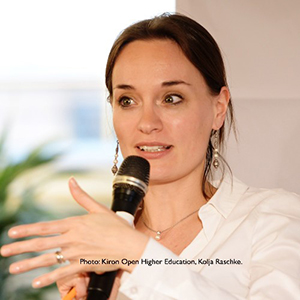 After graduating in 2006, Karoline Popp ventured into the field of migration policy - a move inspired by her undergraduate specialisation in political geography. She explains, "thinking about how space was political and the role of borders quickly led to my interest in transcending those borders - hence, my interest in migration". Karoline talks us through why migration policy is so critical, and how she contributes towards this.
After graduating in 2006, Karoline Popp ventured into the field of migration policy - a move inspired by her undergraduate specialisation in political geography. She explains, "thinking about how space was political and the role of borders quickly led to my interest in transcending those borders - hence, my interest in migration". Karoline talks us through why migration policy is so critical, and how she contributes towards this.
All systems that build a society - the education system, the health system, the labour market, to name but a few - need to become more adapted to diversity. The diversity brought about by migration is very significant, requiring systems to adopt policies and measures that integrate migrants and refugees into wider society:
"Relating to migrants and refugees specifically, there needs to be more spaces, places, and opportunities that create positive and meaningful personal interaction between newcomers and their host community."
This makes the development of migration policy essential. After spending several years working across various locations for the UN's International Organisation for Migration (IOM), Karoline now resides in Berlin and works as a Researcher for the Expert Council of German Foundations on Integration and migration (SVR). Here, she carries out a range of research projects, conducts policy analysis and communicates findings at conferences or to the media. Her areas of expertise include international co-operation and global migration governance, migration and asylum policies in the European Union, and issues of irregular and mixed migration, including migration across the Mediterranean.
Migration can never be understood from just a single perspective: it is always simultaneously an economic and a social issues, it is national and international, personal and political at the same time. It requires a multifaceted way of thinking, an aspect of Karoline's job that BA Geography equipped her well for:
"I like the 'big picture' approach in geographical thinking that combines social and natural sciences. In many ways, I benefitted from the mixed-methods and interdisciplinary approach that characterized the degree. For example, when I was working on the linkages between migration and environmental change, it helped that I had a basic understanding of climate change science."
Though very gratifying, the role does not come without its challenges. Karoline recognises that working from a sometimes abstract and theoretical research / policy perspective is difficult when one is aware of the very tangible challenges, risks and hardships that refugees and migrants face across the world. She tries to balance the remoteness of her 'desk job' by volunteering; for example, by teaching people who recently arrived in Berlin the native language.
Reading Geography as an undergraduate gave Karoline the opportunity to explore where her interests lay, ultimately providing a sound basis for a future in migration policy and research.
James Pattinson, Co-founder and Ordnance Officer, Reluctantly Brave
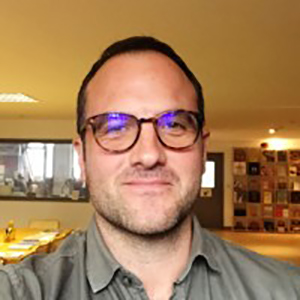 James Pattinson, BA geography graduate, always wanted to have his own business. In 2012, he co-founded Reluctantly Brave, a London-based consultancy and creative agency, with one ambitious goal: "to reorient business by rekindling caring, compassionate capitalism". James fills us in on what his company does, what it takes to found a business, and how thinking like a geographer complements his day-to-day tasks.
James Pattinson, BA geography graduate, always wanted to have his own business. In 2012, he co-founded Reluctantly Brave, a London-based consultancy and creative agency, with one ambitious goal: "to reorient business by rekindling caring, compassionate capitalism". James fills us in on what his company does, what it takes to found a business, and how thinking like a geographer complements his day-to-day tasks.
Part consultancy, part creative agency, Reluctantly Brave is uniquely structured to handle brand and innovation challenges from exploration, to strategy, to implementation. They bring together teams of creatives that range from Nobel Prize winners to children from local schools in Hackney. The far-reaching expertise of this truly diverse team gives unrivalled insights in the development of concepts and strategies. The agency has worked with a wealth of organisations, such as Nando's, Kellogg's, Thomson Reuters and Walgreen Boots Alliance.
James now primarily works as the Ordnance Officer for Reluctantly Brave, where he develops the agency's business model with their partnership team. This includes writing business plans, and building capability and methodologies for leadership development, innovation, culture change and branding. Most recently, he has been leading their award-winning (Young) Braves Program, where 16-24 year olds from any background are trained as strategists to with Reluctantly Brave on client projects.
Now a thriving institution, James recalls several years of evenings, mornings and weekends that were dedicated to building the business. From inception, the company has championed a strong ethical value system: maintaining a commitment to not work with gambling, alcohol or tobacco organisations, and upholding a pledge to spend at least 10% of their time on pro bono work. Maintaining this level of ethics presented its own challenges - but enabled the team to establish their own values.
To James, it is a real point of advantage in business to hold a unique viewpoint - something that his studies in geography encouraged him to develop. Having a broad and informed world view is critical when thinking of the direction of a business over long-term time horizons. He continues:
"Geography provides an excellent foundation for a career in business. Its huge breadth and diversity gives geographers an invaluable understanding of many of the factors at play in our volatile, complex and ambiguous world."
James bravely journeyed into entrepreneurship to pursue a long-term ambition of his. Equipped with a broad world view, one informed by his geography studies, he is now a co-founder of a successful company. To any budding entrepreneurs out there, James leaves us with a key piece of advice:
"Be curious. Then stay curious! Everyone you meet is a potential inspiration so be open to experiences and people. Lastly, try and remain humble, this is always a balance with having the confidence to reach for the stars and achieve the impossible".
Francesca Marenghi, Senior Global Partnerships Manager, UNICEF
Working as a casual Library assistant during the summer holidays of her undergraduate years, Francesca Marenghi (BA 2001) never imagined she would now be living her dream of working in the international development sector - a dream inspired by studying political, social and economic geography at Oxford. Far from stacking bookshelves, Francesca now works for UNICEF in Geneva. Here, she tells us all about how she managed to secure her dream role.
As many can vouch for, it is difficult to venture straight into a career in the international development NGO sector. One often needs to volunteer or intern somewhere to build up their experience and networks. In knowledge of this, after graduation Francesca embarked into various temping roles for national charities, including English Heritage, The Children's Society and Teenage Cancer Trust.
These experiences eventually landed her a senior role with Street Child United for a year. This "whirlwind year" gave Francesca crucial experience in fundraising for a development charity. During this time, she was responsible for raising funds from companies, foundations, major donors, individuals and volunteers, and leveraging commercial sponsorship for the Street Child World Cup event in Brazil (2015). The charity is a key vehicle in changing people's negative perception of street children across the globe.
Having gained a wealth of experience across several charities, Francesca then moved into a more permanent position at UNICEF. She headed up UNICEF UK's corporate partnerships team in London for five years, which consisted of 26 corporate fundraisers all raising vital funds for the work UNICEF does supporting the world's children. After these five years, however, Francesca was soon ready to experience a more global role and get out of the UK market.
Francesca now works as a Senior Global Partnerships Manager at the UN headquarters in Geneva. Working alongside real experts in the field, Francesca spends her days number-crunching, supporting markets to forecast, growing UNICEF budgets, developing existing partnerships, and winning new partnerships. It is a fast-paced and dynamic environment and, importantly, brings about real societal change. Visiting UNICEF projects out in the field reminds Francesca of this:
"When I visit the projects where UNICEF has made a difference and continues to build communities from the grass-roots up, it makes me believe that this is where I belong - in this sector."
Looking back, Francesca recognises that many of the skills essential to her role today were honed during her undergraduate studies. She notes that it taught her reflectivity and resilience, amongst several other valuable traits:
"My Oxford degree has taught me more than I can give it justice to in writing. It has set me up to be able to fast track my career, getting to where I wanted to, at pace."
Utilising the skills and tools she developed at University, Francesca is now pursuing her dream job. In her capacity as a Senior Global Partnerships Manager with UNICEF, Francesca promotes a better world for less-fortunate children all over the globe.




